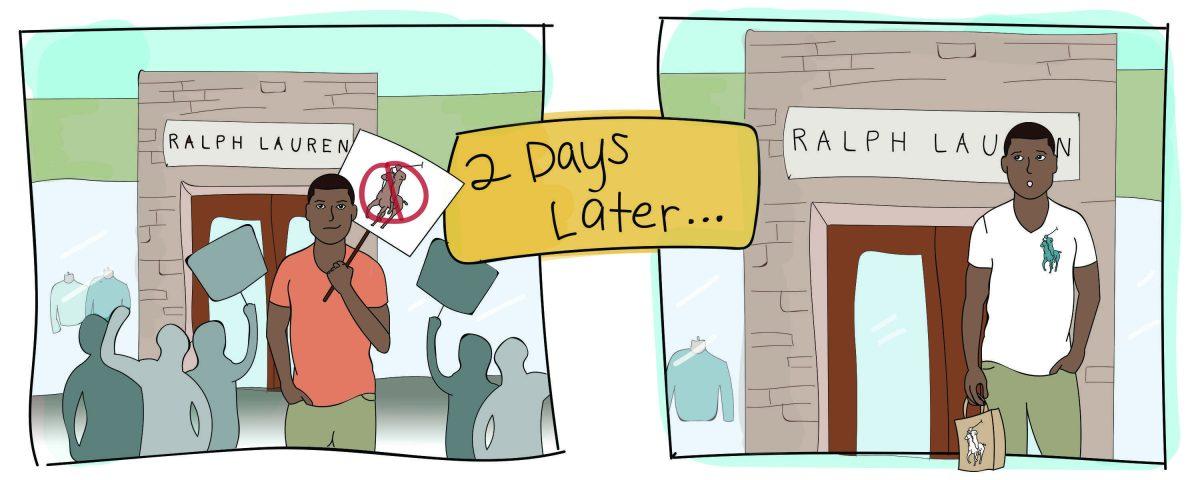A new boycott campaign seems to pop up every week. Usually it begins on Twitter, when one user puts a hashtag in front of whatever company is currently in the dog yard that day, and viola! A call to action is sweeping across the internet and making headlines, only to disappear a few hours later.
Under the few days of the Trump administration, we’ve had #boycottRalphLauren and #deleteUber. These politically charged boycotts usually start by one misunderstood piece of information and finish with little, if any, repercussions for the company. In short, they’re ineffective and often inaccurate.
Remember the Starbucks boycott? Trump supporters’ claimed that Starbuck’s plan to hire 10,000 refugees was an attack on other disadvantaged groups in need of jobs such as veterans and communities in poverty. In reality, the company had already launched a similar plan to hire 10,000 veterans back in 2013 and had recently started implementing another plan to open stores in lower-income communities as a way to increase jobs. Then there was the ingenious boycott where Trump supporters were buying Starbucks just to write Trump on the cups.
Not long ago, Ralph Lauren came under Twitter fire from the other side of the political spectrum after creating Melania’s inauguration dress. #boycottRalphLauren was taken up all over the internet yet lasted only a matter of hours. I highly doubt anyone who used the hashtag bought Ralph Lauren previously or legitimately stopped if they did.
Most recently there was the Uber fiasco. On Saturday, Jan. 28, the Taxi Workers’ Alliance, a nonprofit union that claims to represent more than 50,000 drivers in New York City, went on strike at JFK airport between 6 p.m. and 7 p.m.
At 7:36 p.m., Uber declared it was turning off surge pricing for customers at the airport, meaning cheaper rides but longer wait times as more people request rides.
Many people saw this as a cheap move on Uber’s part to capitalize on the strike, while others claimed Uber’s CEO Travis Kalanick’s involvement with Trump’s business advisory council was the real reason for a boycott and the surge pricing was just the last straw.
Unlike most, the boycott was somewhat effective in hurting Uber. On Monday, Lyft, another popular ride hail company that many Uber spurners downloaded in its place, surpassed Uber in daily downloads on the App Store for the first time ever, according to Mobile Action, which studies the app market.
Lyft also actively capitalized on Uber’s negative publicity, donating one million to the ACLU to get more praise from those opposing Trump’s immigration ban; Uber, meanwhile, tried to recover by claiming they will help their drivers affected by the ban with 24/7 legal support, compensation for lost earnings, and a three million legal defense fund according to an email sent out by Kalanick on Monday.
But here’s the catch. Two billionaire Trump advisors, Peter Thiel and Carl Icahn have hundreds of millions invested into Lyft. Thus, the attempt at boycotting one company because they simply didn’t protest the immigration ban actually helps another company that proactively supports Trump and, by association, the ban itself.
The moral of this story is that companies don’t truly care about you or your beliefs, they’re here to make a profit. As we are learning with Uber and Lyft, choosing one company over its competitor solely because they support a political idea or candidate that you disagree with is blissful ignorance.
Employees are a different matter, but those who actually control where the money goes could not care less about politics or social campaigns, as long as they’re on the side in power.
You’re better off protesting the actual government’s policy instead of a company acting in their own interests. Or, if you’re fired up to attack a company, focus on ones like Nestlé and Wal-Mart, who have committed longstanding ethical breaches in their products and employees.
Ryan Thaxton is a 20-year-old journalism sophomore from Monroe, Louisiana.





